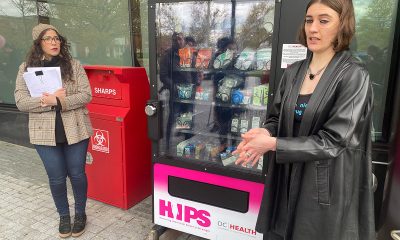homepage news
Whitman-Walker celebrates 40 years
Pioneer in D.C.’s battle against AIDS evolved into community health center
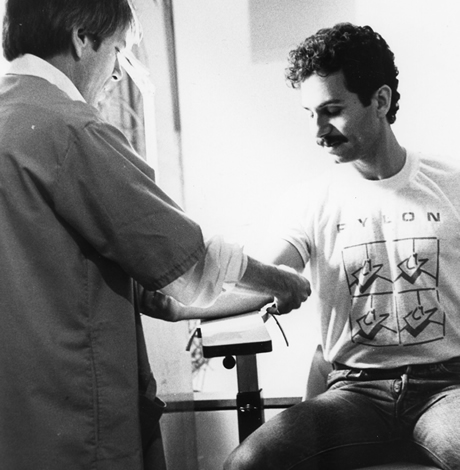
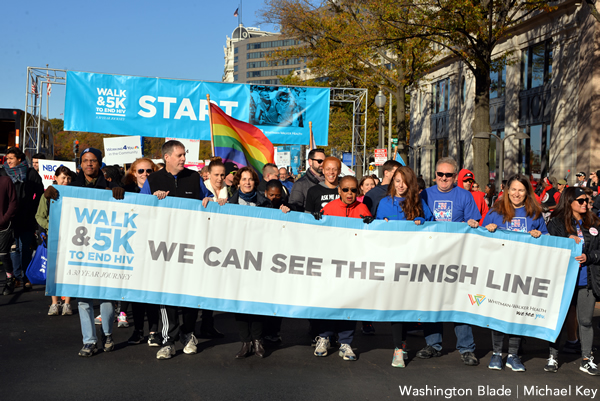
Whitman-Walker Health’s annual Walk to End HIV. (Washington Blade photo by Michael Key)
Whitman-Walker Health, D.C.’s preeminent community health center serving the LGBT community, is set to celebrate the 40th anniversary of its incorporation on Jan. 13, 1978 as the then Whitman-Walker Clinic.
Its current executive director, Don Blanchon, points out that the organization that became Whitman-Walker — the Gay Men’s VD Clinic, an arm of the then Washington Free Clinic — was founded in November 1973 and began operating in the basement of D.C.’s Georgetown Lutheran Church.
A timeline posted on Whitman-Walker’s website shows that the Gay Men’s VD Clinic, which began as an all-volunteer operation, hired its first full-time staff in 1976. In 1977, according to the Whitman-Walker history write-up, leaders of the fledgling clinic broke away from the Washington Free Clinic and began to develop “their vision for a new, diverse health care organization.”
At the time the group incorporated as Whitman-Walker Clinic in 1978 the D.C. Department of Human Resources provided it with $15,000 in funding, marking the first in a long history of city financial support for Whitman-Walker.
Blanchon, who did not become Whitman-Walker’s executive director until May 2006, said he has since learned from others familiar with its early years that its founders set a precedent for its mission and value system that remain in place today.
“At the end of the day, before there was ever HIV and AIDS, there was an ideal that the gay community needed a different type of health care that was affirming of who they were,” he said. “And that was all the way back to 1973.”
He notes that since then Whitman-Walker has broadened its health care work to cover the full diversity of the LGBT community, with greatly expanded programs and services for the transgender community in recent years.
Blanchon said today’s Whitman-Walker Health has an operating budget of nearly $103 million and a staff of 290 employees.
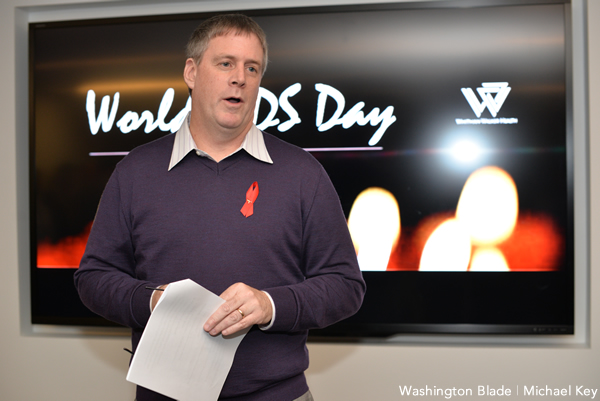
‘Before there was ever HIV and AIDS, there was an ideal that the gay community needed a different type of health care,’ said Whitman-Walker Executive Director Don Blanchon. (Washington Blade photo by Michael Key)
Although Whitman-Walker broke new ground in its first decade as an LGBT clinic, those familiar with its 40-year history say it established itself as one of the city’s most well-known healthcare institutions beginning in 1983, when the AIDS epidemic hit D.C. in full force.
Two years earlier, D.C. gay attorney Jim Graham was elected president of the Whitman-Walker board in 1981, the same year the U.S. Centers for Disease Control and Prevention’s Morbidity and Mortality Report published an account of how young gay men were being stricken with a rare form of pneumonia normally contracted by elderly people with compromised immune systems.
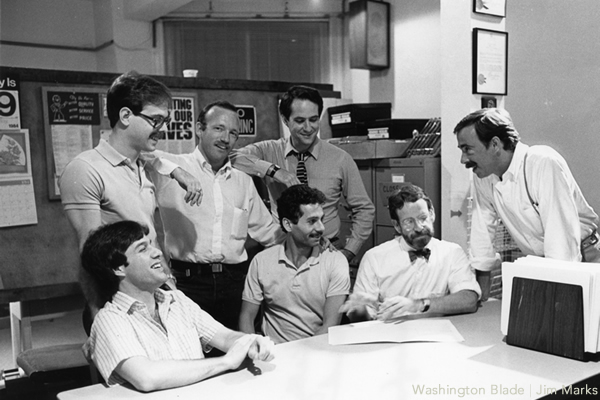
Whitman-Walker Clinic staff on June 15, 1984. (Washington Blade archive photo by Jim Marks)
The CDC report was the first of a series of updated reports that later identified the condition afflicting gay men and other population groups as HIV/AIDS. It was at that time that Whitman-Walker assumed a leadership role in addressing the epidemic in the District of Columbia.
Among other things, it launched an AIDS education program along with counseling and direct services for people with AIDS. A short time later it began its “Buddy” program that recruited scores of volunteers to help people living with AIDS at a time when little or no official government programs existed to take on that role.
On April 4, 1983, Whitman-Walker organized the first D.C. AIDS Forum at George Washington University’s Lisner Auditorium. Hundreds of gay men turned out for the event and heard Dr. Richard DiGioia, a local physician whose practice catered to the gay community, talk about the disease’s symptoms and the early and mostly ineffective treatment options available at that time.
In 1984, the Whitman-Walker board named Jim Graham as the clinic’s new executive director. Graham has been credited with spearheading Whitman-Walker’s rapid growth as one of the nation’s leading AIDS service organizations.
During his first years at Whitman-Walker’s helm, Graham used his skills as a lawyer to provide legal help for gay men and others with AIDS who often were rejected by their families and faced workplace discrimination before becoming too sick to hold a job. Blanchon calls Graham the father of Whitman-Walker’s highly regarded Legal Services program, which currently enjoys legal support from attorneys with some of the city’s most prominent law firms.
Under Graham’s leadership, Whitman-Walker bought several buildings along or near the 14th Street, N.W. corridor north of downtown. Among the purchases were its headquarters at 1407 S Street, N.W., just off 14th Street. In 1985 the Robert N. Schwartz House was opened as the city’s first home for people with AIDS, becoming one in a series of houses Whitman-Walker purchased to house people with HIV/AIDS.
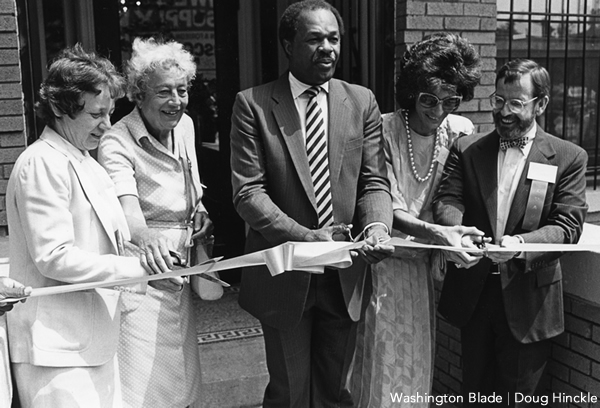
From left, Whitman-Walker President Mary Jane Wood, former head of the D.C. Council Commission on Health Polly Shackleton, D.C. Mayor Marion Barry, Effi Barry and Whitman-Walker Administrator Jim Graham attend the dedication of the new clinic facility on June 23, 1987. (Washington Blade photo by Doug Hinckle)
Most of the houses were financed by donations from the community and through bequests from gay men who died of AIDS and named Whitman-Walker in their wills.
As part of its continued expansion, Whitman-Walker opened facilities in Northern Virginia and suburban Maryland, bought a building in Anacostia where it opened the Max Robinson Center, its first AIDS service facility located east of the Anacostia River.
In 1993, Whitman-Walker opened its Elizabeth Taylor Medical Center, named in honor of the famed actress turned AIDS activist, in another building it purchased at 14th and R Streets, N.W. The new facility received international press coverage when Taylor attended its opening ceremony that was carefully planned by Graham.
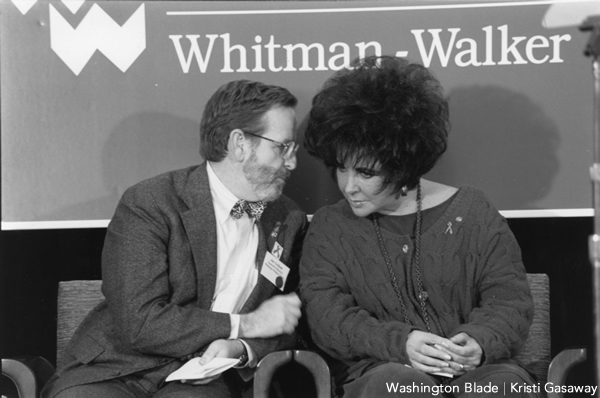
Jim Graham speaks with Elizabeth Taylor at the opening of the Elizabeth Taylor Medical Center in 1993. (Washington Blade photo by Kristi Gasaway)
Graham resigned as executive director in January 1999 to take office as a member of the D.C. City Council, to which he was elected in November 1998. Around the time of his departure changes in the course of the AIDS epidemic began to take a financial toll on Whitman-Walker, according to those familiar with its operations at that time.
With scientific advances in anti-retroviral drugs that began to effectively curtail the virus in those who were infected, patients began to live longer and required more services for longer periods of time. The longstanding assumption that AIDS was a death sentence was replaced with the new world order that it had become a mostly non-fatal chronic disease.
While this was hailed as a wonderful development by Whitman-Walker’s large staff and vast network of programs and supporters, observers said it had an adverse impact on fundraising and other streams of income that the clinic and AIDS service group had relied upon for nearly 20 years.
As expenses for long-term treatment of patients increased, donations from the Whitman-Walker AIDS Walk, its largest single fundraising event, began to decline along with individual private donations. Some believed this was due in part to the assumption that the need to give money to AIDS causes was lessened due to the medical progress and improved treatments that stopped people from dying.
By 2005, Whitman-Walker faced its most serious financial crisis when news surfaced that it might not be able to make its payroll for the first time in its history. Part of the crisis stemmed from the dual developments of the city’s long bureaucratic delays in reimbursing health clinics, including Whitman-Walker, for health related services they provided for the city. At the same time, federal funds associated with the Ryan White CARE Act were curtailed or delayed.
The crisis prompted the board to close several programs, including its food bank and some of its sites in Virginia and Maryland. At the initiative of then-D.C. Council member David Catania (I-At-Large), who was one of two gay Council members at the time, the D.C. government provided a one-time grant of $3.2 million to Whitman-Walker, a development that some observers believed helped it avoid having to shut its doors entirely and possibly declare bankruptcy.
In the midst of these developments, Whitman-Walker’s board in late 2005 adopted a series of changes and reforms to strengthen its financial viability, including a decision to change its structure from a mostly AIDS service organization to a community health center known officially as a Federally Qualified Health Center.
The new structure, which took effect in 2006, immediately enabled Whitman-Walker to accept far more private and government health insurance plans, decreasing its reliance and dependence on private donations and government funding.
In March 2006, the board announced it had hired Blanchon to become the new executive director beginning May 1. Blanchon had formerly served as CEO of a managed care health plan in Maryland and as vice president for Medicaid and Medicare programs for a medical management company.
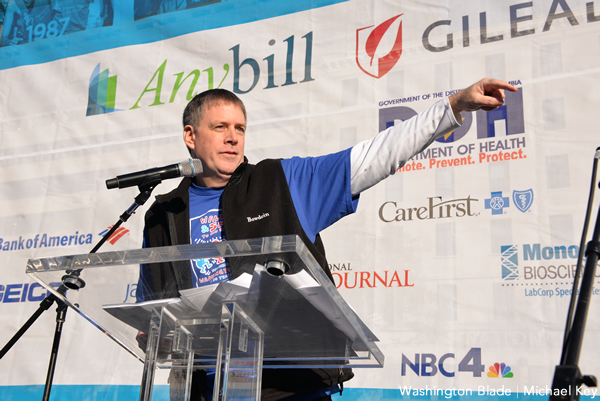
Whitman-Walker Health’s Don Blanchon attends the Walk to End HIV. (Washington Blade file photo by Michael Key)
Some in the LGBT community initially expressed concern that Blanchon, with the board’s full approval, would turn Whitman-Walker into a less community oriented “HMO” using profit-making techniques to undo Whitman-Walker’s longstanding role as a progressive, LGBT clinic. But others, including Blanchon, argued that the changes were needed to enable Whitman-Walker to continue its longstanding mission while becoming far more financially secure.
By March 2007, the U.S. Health Resources and Services Administration (HRSA) approved Whitman-Walker’s designation as a Federally Qualified Health Center (FQHC), a status that enabled it to accept private insurance and Medicaid from the large number of the patients it had been treating.
“We’re blessed in the District of Columbia to have 98 or 99 percent of the population with some type of health insurance,” Blanchon told the Blade in an interview last week. “And so it would be foolish if not irresponsible for Whitman-Walker not to take health insurance,” he said.
“If 99 out of 100 people who walk through the door have some kind of coverage – CareFirst, Medicare, Medicaid — why would we say we shouldn’t take that?” he said. “That’s crazy. That’s not a good use of people’s money.”
Blanchon noted that the decision by the board to become a Federally Qualified Health Center requires that Whitman-Walker take in and provide services to all people in the community and the city, not just members of the LGBT community. But he said that requirement does not and has not changed Whitman-Walker’s mission of serving as an LGBTQ community health center that’s open to everyone.
In the years following the 2005-2006 changes, Whitman-Walker rebounded financially to a point in 2010 when it closed its fiscal year with a surplus for the first time in a decade. In 2012, one year after it changed its name to Whitman-Walker Health, it announced it finished its fiscal year in 2011 with another still larger surplus.
Today, Blanchon says that while Whitman-Walker Health is in good financial shape it still faces hurdles as circumstances in the city and in the nation continue to change. With the aim of remaining financially strong and to continue to expand its services to more people in the LGBT and broader community, Blanchon notes that Whitman-Walker in recent years entered into arrangements to acquire its new, expanded medical building at 1515 14th Street, N.W., which it leases, and to redevelop the Elizabeth Taylor Building through a partnership with a real estate developer.
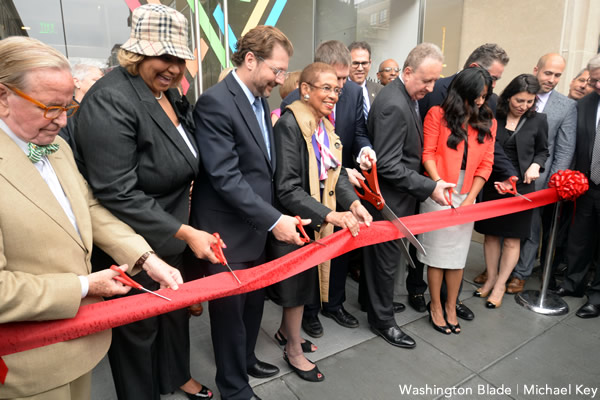
City officials attend the ribbon-cutting ceremony at Whitman-Walker Health’s new facility on June 4, 2015. (Washington Blade photo by Michael Key)
The Taylor building site is currently being transformed into a large mixed use development, with space for Whitman-Walker along with residential apartments and retail and commercial space.
Blanchon points out that Whitman-Walker will remain the majority owner of the Taylor Building site while at the same time benefiting from the tremendous appreciation in its value brought about by the transformation of the 14th Street corridor in the years since Jim Graham helped orchestrate Whitman-Walker’s purchase of that building.
In addition to buying the building itself, Graham arranged a short time later for Whitman-Walker to buy two adjacent buildings and the land in the entire block on which the buildings were located.
While the benefit of the appreciation will help Whitman-Walker remain financially viable in the future, Blanchon said it has created what he says is a false image that Whitman-Walker no longer needs community donations and support because of “all this building we’re doing” between the Taylor Building project and the new leased building at 1515 14th Street, N.W.
“And the reality is nothing could be further from the truth,” he said. Among other things, Blanchon said income generated from the Taylor Building project will be used to expand and upgrade its presence east of the river in Anacostia. He said Whitman-Walker would soon be announcing plans for expanding the Max Robinson Center.
“So the board has made what I think is a really prudent decision,” he said. “This is completely a reinvestment of economic value…What we’re saying is this is analogous and it’s consistent with our values, which is we’ve benefited from something and we need to reinvest that in the next place where there is need.”
Abby Fenton, Whitman-Walker’s Chief External Affairs Officer, said Whitman-Walker would be announcing a series of events and activities scheduled for the coming months as part of an ongoing celebration of its anniversary, including an “anniversary gala” scheduled for Sept. 22.
Blanchon, meanwhile, said he was hopeful that the anniversary events will draw attention to Whitman-Walker’s future role in providing for healthcare needs of the LGBT community as well as its work in the past.
In discussing what he called the dark days of the AIDS epidemic Blanchon said people should never forget the role that Whitman-Walker’s many leaders, supporters, and volunteers played in responding to the epidemic.
“That is fundamentally one of the most compassionate and most human responses that you’ll ever see in the face of tragedy,” he said. “And it’s unbelievably powerful. It’s unbelievably emotive. It’s unbelievably sad and painful to so many of us.”
But while AIDS continues to be a serious problem facing D.C. and the nation, Blanchon said Whitman-Walker must adapt to the changes that have taken place over the past 20 years if it is to remain relevant to the community it serves.
“As poignant, as important as our community role was during the epidemic, with all due respect, we don’t live there now,” he said. “And that can’t solely define us anymore. We have to be defined by what the LGBTQ community needs from us now and in the future,” he continued. “And what are we willing to do with their continued support, financially, and their time, their talents? And it has to be about moving forward.”
Whitman-Walker’s 40th anniversary events
Whitman-Walker Health has released the following list of events it says it will hold this year between Jan. 20 and Oct. 27 to celebrate its 40th anniversary.
Jan. 20: 8-11 p.m. 40TH ANNIVERSARY DANCE PARTY – Dance party at Town to celebrate WWH’s birthday
Feb. 21: 8-10 a.m. MAX ROBINSON PANEL DISCUSSION – Join local journalists as they remember Max Robinson and also talk about their own careers as African-American reporters in D.C. The event will be held at the The Lincoln Theatre. Discussion will be moderated by Max Robinson’s former co-anchor Gordon Peterson. Panel will include Maureen Bunyan (confirmed).
May 23, 2018 GOING THE EXTRA MILE – Join us for our an annual cocktail reception at The Hamilton honoring our pro bono legal volunteers, recognizing our allies, and raising money to continue to provide free legal services to our underserved neighbors.
June 2, 2018 CAPITAL PRIDE WOMEN’S KICK-OFF PARTY at Big Chief with Mautner Project of Whitman-Walker Health
Sept. 22, 2018 40th ANNIVERSARY GALA Join us at the Marriott Marquis Hotel for our big event. An opening cocktail reception with passed hors d’oeuvres will kick off the evening. Following the reception, the gala will extend into a seated dinner and speaking program reflecting on our past, present and future.
Oct. 27, 2018 THE WALK TO END HIV Join us for our most important most fun fundraising event of the year. The Walk & 5K to End HIV is a fundraising walk and 5K timed run benefiting Whitman-Walker Health.
homepage news
Honoring the legacy of New Orleans’ 1973 UpStairs Lounge fire
Why the arson attack that killed 32 gay men still resonates 50 years later

On June 23 of last year, I held the microphone as a gay man in the New Orleans City Council Chamber and related a lost piece of queer history to the seven council members. I told this story to disabuse all New Orleanians of the notion that silence and accommodation, in the face of institutional and official failures, are a path to healing.
The story I related to them began on a typical Sunday night at a second-story bar on the fringe of New Orleans’ French Quarter in 1973, where working-class men would gather around a white baby grand piano and belt out the lyrics to a song that was the anthem of their hidden community, “United We Stand” by the Brotherhood of Man.
“United we stand,” the men would sing together, “divided we fall” — the words epitomizing the ethos of their beloved UpStairs Lounge bar, an egalitarian free space that served as a forerunner to today’s queer safe havens.
Around that piano in the 1970s Deep South, gays and lesbians, white and Black queens, Christians and non-Christians, and even early gender minorities could cast aside the racism, sexism, and homophobia of the times to find acceptance and companionship for a moment.
For regulars, the UpStairs Lounge was a miracle, a small pocket of acceptance in a broader world where their very identities were illegal.
On the Sunday night of June 24, 1973, their voices were silenced in a murderous act of arson that claimed 32 lives and still stands as the deadliest fire in New Orleans history — and the worst mass killing of gays in 20th century America.
As 13 fire companies struggled to douse the inferno, police refused to question the chief suspect, even though gay witnesses identified and brought the soot-covered man to officers idly standing by. This suspect, an internally conflicted gay-for-pay sex worker named Rodger Dale Nunez, had been ejected from the UpStairs Lounge screaming the word “burn” minutes before, but New Orleans police rebuffed the testimony of fire survivors on the street and allowed Nunez to disappear.
As the fire raged, police denigrated the deceased to reporters on the street: “Some thieves hung out there, and you know this was a queer bar.”
For days afterward, the carnage met with official silence. With no local gay political leaders willing to step forward, national Gay Liberation-era figures like Rev. Troy Perry of the Metropolitan Community Church flew in to “help our bereaved brothers and sisters” — and shatter officialdom’s code of silence.
Perry broke local taboos by holding a press conference as an openly gay man. “It’s high time that you people, in New Orleans, Louisiana, got the message and joined the rest of the Union,” Perry said.
Two days later, on June 26, 1973, as families hesitated to step forward to identify their kin in the morgue, UpStairs Lounge owner Phil Esteve stood in his badly charred bar, the air still foul with death. He rebuffed attempts by Perry to turn the fire into a call for visibility and progress for homosexuals.
“This fire had very little to do with the gay movement or with anything gay,” Esteve told a reporter from The Philadelphia Inquirer. “I do not want my bar or this tragedy to be used to further any of their causes.”
Conspicuously, no photos of Esteve appeared in coverage of the UpStairs Lounge fire or its aftermath — and the bar owner also remained silent as he witnessed police looting the ashes of his business.
“Phil said the cash register, juke box, cigarette machine and some wallets had money removed,” recounted Esteve’s friend Bob McAnear, a former U.S. Customs officer. “Phil wouldn’t report it because, if he did, police would never allow him to operate a bar in New Orleans again.”
The next day, gay bar owners, incensed at declining gay bar traffic amid an atmosphere of anxiety, confronted Perry at a clandestine meeting. “How dare you hold your damn news conferences!” one business owner shouted.
Ignoring calls for gay self-censorship, Perry held a 250-person memorial for the fire victims the following Sunday, July 1, culminating in mourners defiantly marching out the front door of a French Quarter church into waiting news cameras. “Reverend Troy Perry awoke several sleeping giants, me being one of them,” recalled Charlene Schneider, a lesbian activist who walked out of that front door with Perry.

Esteve doubted the UpStairs Lounge story’s capacity to rouse gay political fervor. As the coroner buried four of his former patrons anonymously on the edge of town, Esteve quietly collected at least $25,000 in fire insurance proceeds. Less than a year later, he used the money to open another gay bar called the Post Office, where patrons of the UpStairs Lounge — some with visible burn scars — gathered but were discouraged from singing “United We Stand.”
New Orleans cops neglected to question the chief arson suspect and closed the investigation without answers in late August 1973. Gay elites in the city’s power structure began gaslighting the mourners who marched with Perry into the news cameras, casting suspicion on their memories and re-characterizing their moment of liberation as a stunt.
When a local gay journalist asked in April 1977, “Where are the gay activists in New Orleans?,” Esteve responded that there were none, because none were needed. “We don’t feel we’re discriminated against,” Esteve said. “New Orleans gays are different from gays anywhere else… Perhaps there is some correlation between the amount of gay activism in other cities and the degree of police harassment.”

An attitude of nihilism and disavowal descended upon the memory of the UpStairs Lounge victims, goaded by Esteve and fellow gay entrepreneurs who earned their keep via gay patrons drowning their sorrows each night instead of protesting the injustices that kept them drinking.
Into the 1980s, the story of the UpStairs Lounge all but vanished from conversation — with the exception of a few sanctuaries for gay political debate such as the local lesbian bar Charlene’s, run by the activist Charlene Schneider.
By 1988, the 15th anniversary of the fire, the UpStairs Lounge narrative comprised little more than a call for better fire codes and indoor sprinklers. UpStairs Lounge survivor Stewart Butler summed it up: “A tragedy that, as far as I know, no good came of.”
Finally, in 1991, at Stewart Butler and Charlene Schneider’s nudging, the UpStairs Lounge story became aligned with the crusade of liberated gays and lesbians seeking equal rights in Louisiana. The halls of power responded with intermittent progress. The New Orleans City Council, horrified by the story but not yet ready to take its look in the mirror, enacted an anti-discrimination ordinance protecting gays and lesbians in housing, employment, and public accommodations that Dec. 12 — more than 18 years after the fire.
“I believe the fire was the catalyst for the anger to bring us all to the table,” Schneider told The Times-Picayune, a tacit rebuke to Esteve’s strategy of silent accommodation. Even Esteve seemed to change his stance with time, granting a full interview with the first UpStairs Lounge scholar Johnny Townsend sometime around 1989.
Most of the figures in this historic tale are now deceased. What’s left is an enduring story that refused to go gently. The story now echoes around the world — a musical about the UpStairs Lounge fire recently played in Tokyo, translating the gay underworld of the 1973 French Quarter for Japanese audiences.
When I finished my presentation to the City Council last June, I looked up to see the seven council members in tears. Unanimously, they approved a resolution acknowledging the historic failures of city leaders in the wake of the UpStairs Lounge fire.
Council members personally apologized to UpStairs Lounge families and survivors seated in the chamber in a symbolic act that, though it could not bring back those who died, still mattered greatly to those whose pain had been denied, leaving them to grieve alone. At long last, official silence and indifference gave way to heartfelt words of healing.
The way Americans remember the past is an active, ongoing process. Our collective memory is malleable, but it matters because it speaks volumes about our maturity as a people, how we acknowledge the past’s influence in our lives, and how it shapes the examples we set for our youth. Do we grapple with difficult truths, or do we duck accountability by defaulting to nostalgia and bluster? Or worse, do we simply ignore the past until it fades into a black hole of ignorance and indifference?
I believe that a factual retelling of the UpStairs Lounge tragedy — and how, 50 years onward, it became known internationally — resonates beyond our current divides. It reminds queer and non-queer Americans that ignoring the past holds back the present, and that silence is no cure for what ails a participatory nation.
Silence isolates. Silence gaslights and shrouds. It preserves the power structures that scapegoat the disempowered.
Solidarity, on the other hand, unites. Solidarity illuminates a path forward together. Above all, solidarity transforms the downtrodden into a resounding chorus of citizens — in the spirit of voices who once gathered ‘round a white baby grand piano and sang, joyfully and loudly, “United We Stand.”

Robert W. Fieseler is a New Orleans-based journalist and the author of “Tinderbox: the Untold Story of the Up Stairs Lounge Fire and the Rise of Gay Liberation.”
homepage news
New Supreme Court term includes critical LGBTQ case with ‘terrifying’ consequences
Business owner seeks to decline services for same-sex weddings

The U.S. Supreme Court, after a decision overturning Roe v. Wade that still leaves many reeling, is starting a new term with justices slated to revisit the issue of LGBTQ rights.
In 303 Creative v. Elenis, the court will return to the issue of whether or not providers of custom-made goods can refuse service to LGBTQ customers on First Amendment grounds. In this case, the business owner is Lorie Smith, a website designer in Colorado who wants to opt out of providing her graphic design services for same-sex weddings despite the civil rights law in her state.
Jennifer Pizer, acting chief legal officer of Lambda Legal, said in an interview with the Blade, “it’s not too much to say an immeasurably huge amount is at stake” for LGBTQ people depending on the outcome of the case.
“This contrived idea that making custom goods, or offering a custom service, somehow tacitly conveys an endorsement of the person — if that were to be accepted, that would be a profound change in the law,” Pizer said. “And the stakes are very high because there are no practical, obvious, principled ways to limit that kind of an exception, and if the law isn’t clear in this regard, then the people who are at risk of experiencing discrimination have no security, no effective protection by having a non-discrimination laws, because at any moment, as one makes their way through the commercial marketplace, you don’t know whether a particular business person is going to refuse to serve you.”
The upcoming arguments and decision in the 303 Creative case mark a return to LGBTQ rights for the Supreme Court, which had no lawsuit to directly address the issue in its previous term, although many argued the Dobbs decision put LGBTQ rights in peril and threatened access to abortion for LGBTQ people.
And yet, the 303 Creative case is similar to other cases the Supreme Court has previously heard on the providers of services seeking the right to deny services based on First Amendment grounds, such as Masterpiece Cakeshop and Fulton v. City of Philadelphia. In both of those cases, however, the court issued narrow rulings on the facts of litigation, declining to issue sweeping rulings either upholding non-discrimination principles or First Amendment exemptions.
Pizer, who signed one of the friend-of-the-court briefs in opposition to 303 Creative, said the case is “similar in the goals” of the Masterpiece Cakeshop litigation on the basis they both seek exemptions to the same non-discrimination law that governs their business, the Colorado Anti-Discrimination Act, or CADA, and seek “to further the social and political argument that they should be free to refuse same-sex couples or LGBTQ people in particular.”
“So there’s the legal goal, and it connects to the social and political goals and in that sense, it’s the same as Masterpiece,” Pizer said. “And so there are multiple problems with it again, as a legal matter, but also as a social matter, because as with the religion argument, it flows from the idea that having something to do with us is endorsing us.”
One difference: the Masterpiece Cakeshop litigation stemmed from an act of refusal of service after owner, Jack Phillips, declined to make a custom-made wedding cake for a same-sex couple for their upcoming wedding. No act of discrimination in the past, however, is present in the 303 Creative case. The owner seeks to put on her website a disclaimer she won’t provide services for same-sex weddings, signaling an intent to discriminate against same-sex couples rather than having done so.
As such, expect issues of standing — whether or not either party is personally aggrieved and able bring to a lawsuit — to be hashed out in arguments as well as whether the litigation is ripe for review as justices consider the case. It’s not hard to see U.S. Chief Justice John Roberts, who has sought to lead the court to reach less sweeping decisions (sometimes successfully, and sometimes in the Dobbs case not successfully) to push for a decision along these lines.
Another key difference: The 303 Creative case hinges on the argument of freedom of speech as opposed to the two-fold argument of freedom of speech and freedom of religious exercise in the Masterpiece Cakeshop litigation. Although 303 Creative requested in its petition to the Supreme Court review of both issues of speech and religion, justices elected only to take up the issue of free speech in granting a writ of certiorari (or agreement to take up a case). Justices also declined to accept another question in the petition request of review of the 1990 precedent in Smith v. Employment Division, which concluded states can enforce neutral generally applicable laws on citizens with religious objections without violating the First Amendment.
Representing 303 Creative in the lawsuit is Alliance Defending Freedom, a law firm that has sought to undermine civil rights laws for LGBTQ people with litigation seeking exemptions based on the First Amendment, such as the Masterpiece Cakeshop case.
Kristen Waggoner, president of Alliance Defending Freedom, wrote in a Sept. 12 legal brief signed by her and other attorneys that a decision in favor of 303 Creative boils down to a clear-cut violation of the First Amendment.
“Colorado and the United States still contend that CADA only regulates sales transactions,” the brief says. “But their cases do not apply because they involve non-expressive activities: selling BBQ, firing employees, restricting school attendance, limiting club memberships, and providing room access. Colorado’s own cases agree that the government may not use public-accommodation laws to affect a commercial actor’s speech.”
Pizer, however, pushed back strongly on the idea a decision in favor of 303 Creative would be as focused as Alliance Defending Freedom purports it would be, arguing it could open the door to widespread discrimination against LGBTQ people.
“One way to put it is art tends to be in the eye of the beholder,” Pizer said. “Is something of a craft, or is it art? I feel like I’m channeling Lily Tomlin. Remember ‘soup and art’? We have had an understanding that whether something is beautiful or not is not the determining factor about whether something is protected as artistic expression. There’s a legal test that recognizes if this is speech, whose speech is it, whose message is it? Would anyone who was hearing the speech or seeing the message understand it to be the message of the customer or of the merchants or craftsmen or business person?”
Despite the implications in the case for LGBTQ rights, 303 Creative may have supporters among LGBTQ people who consider themselves proponents of free speech.
One joint friend-of-the-court brief before the Supreme Court, written by Dale Carpenter, a law professor at Southern Methodist University who’s written in favor of LGBTQ rights, and Eugene Volokh, a First Amendment legal scholar at the University of California, Los Angeles, argues the case is an opportunity to affirm the First Amendment applies to goods and services that are uniquely expressive.
“Distinguishing expressive from non-expressive products in some contexts might be hard, but the Tenth Circuit agreed that Smith’s product does not present a hard case,” the brief says. “Yet that court (and Colorado) declined to recognize any exemption for products constituting speech. The Tenth Circuit has effectively recognized a state interest in subjecting the creation of speech itself to antidiscrimination laws.”
Oral arguments in the case aren’t yet set, but may be announced soon. Set to defend the state of Colorado and enforcement of its non-discrimination law in the case is Colorado Solicitor General Eric Reuel Olson. Just this week, the U.S. Supreme Court announced it would grant the request to the U.S. solicitor general to present arguments before the justices on behalf of the Biden administration.
With a 6-3 conservative majority on the court that has recently scrapped the super-precedent guaranteeing the right to abortion, supporters of LGBTQ rights may think the outcome of the case is all but lost, especially amid widespread fears same-sex marriage would be next on the chopping block. After the U.S. Tenth Circuit Court of Appeals ruled against 303 Creative in the lawsuit, the simple action by the Supreme Court to grant review in the lawsuit suggests they are primed to issue a reversal and rule in favor of the company.
Pizer, acknowledging the call to action issued by LGBTQ groups in the aftermath of the Dobbs decision, conceded the current Supreme Court issuing the ruling in this case is “a terrifying prospect,” but cautioned the issue isn’t so much the makeup of the court but whether or not justices will continue down the path of abolishing case law.
“I think the question that we’re facing with respect to all of the cases or at least many of the cases that are in front of the court right now, is whether this court is going to continue on this radical sort of wrecking ball to the edifice of settled law and seemingly a goal of setting up whole new structures of what our basic legal principles are going to be. Are we going to have another term of that?” Pizer said. “And if so, that’s terrifying.”
homepage news
Kelley Robinson, a Black, queer woman, named president of Human Rights Campaign
Progressive activist a veteran of Planned Parenthood Action Fund

Kelley Robinson, a Black, queer woman and veteran of Planned Parenthood Action Fund, is to become the next president of the Human Rights Campaign, the nation’s leading LGBTQ group announced on Tuesday.
Robinson is set to become the ninth president of the Human Rights Campaign after having served as executive director of Planned Parenthood Action Fund and more than 12 years of experience as a leader in the progressive movement. She’ll be the first Black, queer woman to serve in that role.
“I’m honored and ready to lead HRC — and our more than three million member-advocates — as we continue working to achieve equality and liberation for all Lesbian, Gay, Bisexual, Transgender, and Queer people,” Robinson said. “This is a pivotal moment in our movement for equality for LGBTQ+ people. We, particularly our trans and BIPOC communities, are quite literally in the fight for our lives and facing unprecedented threats that seek to destroy us.”
The next Human Rights Campaign president is named as Democrats are performing well in polls in the mid-term elections after the U.S. Supreme Court overturned Roe v. Wade, leaving an opening for the LGBTQ group to play a key role amid fears LGBTQ rights are next on the chopping block.
“The overturning of Roe v. Wade reminds us we are just one Supreme Court decision away from losing fundamental freedoms including the freedom to marry, voting rights, and privacy,” Robinson said. “We are facing a generational opportunity to rise to these challenges and create real, sustainable change. I believe that working together this change is possible right now. This next chapter of the Human Rights Campaign is about getting to freedom and liberation without any exceptions — and today I am making a promise and commitment to carry this work forward.”
The Human Rights Campaign announces its next president after a nearly year-long search process after the board of directors terminated its former president Alphonso David when he was ensnared in the sexual misconduct scandal that led former New York Gov. Andrew Cuomo to resign. David has denied wrongdoing and filed a lawsuit against the LGBTQ group alleging racial discrimination.

-

 State Department2 days ago
State Department2 days agoState Department releases annual human rights report
-

 Maryland4 days ago
Maryland4 days agoJoe Vogel campaign holds ‘Big Gay Canvass Kickoff’
-

 Politics3 days ago
Politics3 days agoSmithsonian staff concerned about future of LGBTQ programming amid GOP scrutiny
-

 The White House1 day ago
The White House1 day agoWhite House debuts action plan targeting pollutants in drinking water





